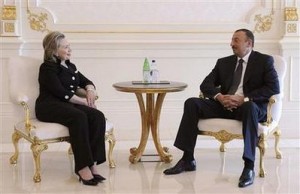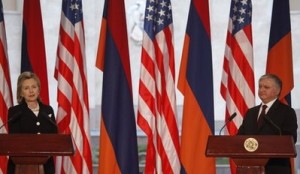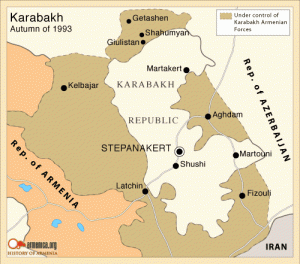 U.S. Secretary of State Hillary Rodham Clinton on Sunday appealed to Armenia and Azerbaijan for a peaceful resolution of a long-running territorial dispute between the neighboring ex-Soviet states, but there were no outward signs of fresh diplomatic progress.
U.S. Secretary of State Hillary Rodham Clinton on Sunday appealed to Armenia and Azerbaijan for a peaceful resolution of a long-running territorial dispute between the neighboring ex-Soviet states, but there were no outward signs of fresh diplomatic progress.
The dispute risks escalating to warfare and has caused diplomatic problems beyond their borders. Clinton, shuttling between capitals, told leaders to act quickly toward settling the matter.
“The final steps toward peace often are the most difficult, but we believe peace is possible,” she said at news conference in Baku with her Azeri counterpart, Elmar Mammadyarov.
She soon made the one-hour flight to Armenia and drove to the presidential palace in Yerevan for a meeting and dinner with President Serge Sarkisian.
Sarkisian said the dispute over Nagorno-Karabakh was the single most important issue for his country — echoing almost word for word a statement hours earlier by Azeri President Ilham Aliyev.
Azerbaijan, which shares a border with Iran, is of particular strategic importance to the United States. Tens of thousands of flights carrying war supplies to U.S. and allied forces in Afghanistan have crossed Azeri airspace over the past nine years of fighting there since the Sept. 11 attacks. Azerbaijan also is part of an overland supply chain that is a key alternative to the main land route through Pakistan to Afghanistan.
The U.S. also has good relations with Armenia and has worked to broker an agreement between Armenia and Turkey on establishing formal diplomatic relations and opening their sealed border after a century of enmity. Turkey, however, has refused to ratify the agreement until Armenia removes its military forces of Nagorno-Karabakh, an enclave in Azerbaijan that has been under control of Armenian troops and ethnic Armenian forces since a 1994 cease-fire. The truce ended six years of war that killed about 30,000 people and displaced an estimated 1 million.
Turks have close cultural and linguistic ties to Azerbaijan.

At an evening news conference in Yerevan, Clinton implicitly criticized Azerbaijan for a recent outbreak of violence. In mid-June, an exchange of gunfire along the front lines near Nagorno-Karabakh killed four ethnic Armenian troops and one Azeri soldier.
“These are unacceptable violations” of the 1994 cease-fire, Clinton said.
She said that before Armenia and Azerbaijan can move to final negotiations, they need to agree on a basic set of principles for settling the dispute, including a pledge not to use or threaten to use force.
Clinton urged Turkey to move ahead with the agreement to establish diplomatic relations with Armenia. She said Armenia has done its part by stating its willingness to go forward with ratification of the agreement once Turkey drops its insistence that Armenia and Azerbaijan first settle their differences.
On both of her stops Sunday, Clinton made a point of stressing the Obama administration’s interest in improving human rights conditions.
In Baku, Clinton met with about a dozen Azeri youth activists, including bloggers, to encourage them to speak out in favor of social change. The substance of their conversation was off limits to reporters traveling with Clinton.
“I happen to think a lot of the success of countries in the 21st century is because they are open societies,” Clinton said in introductory remarks as she and the youths sat around a table beneath a pair of fig trees in the courtyard of a stone building that served as a way station for caravans hundreds of years ago.
 She said she raised the issue of freedom of expression in her talks with Aliyev.
She said she raised the issue of freedom of expression in her talks with Aliyev.
“You know better than I there is lots of work to be done” to strengthen Azerbaijan’s political system, she told them.
She said she and President Barack Obama have received letters about Azeri bloggers imprisoned for their writings.
In her later news conference with the Azeri foreign minister, Clinton was equally direct, saying that while Azerbaijan has made a lot of progress in provide social justice since its independence from the Soviet Union in the early 1990s, “there’s a lot of room for improvement.” AP

Leave a Reply
You must be logged in to post a comment.